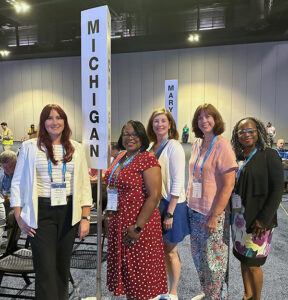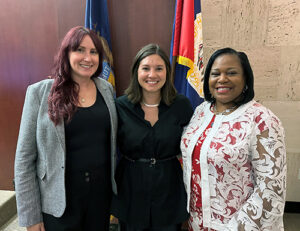Fifteen counties to receive local prosecutor grant funding in state budget
 Fifteen of the 83 counties will receive some of a $17 million appropriation in the state’s FY25 budget for their prosecutor’s office to reduce the caseload per attorney. These grants are meant to address the severe prosecutor shortage plaguing every county in Michigan.
Fifteen of the 83 counties will receive some of a $17 million appropriation in the state’s FY25 budget for their prosecutor’s office to reduce the caseload per attorney. These grants are meant to address the severe prosecutor shortage plaguing every county in Michigan.
The $17 million will allow eligible counties to raise assistant prosecutor salaries and make prosecutor’s offices in those counties more competitive and attractive to prospective employees.
Eligible counties include Berrien, Calhoun, Crawford, Eaton, Genesee, Ingham, Jackson, Kalamazoo, Kalkaska, Kent, Luce, Muskegon, Saginaw, Schoolcraft and Washtenaw.
MAC’s long-term goal is for the state to provide funding to all 83 counties for prosecutor offices and close the gap on the statewide prosecutor shortage.
For more information on this issue, contact Samantha Gibson at gibson@micounties.org.
Podcast 83 episode explores reality of financial hardship in Michigan
 How county leaders can assist the growing number of Michigan households experiencing financial hardship is the focus of a special episode of Podcast 83.
How county leaders can assist the growing number of Michigan households experiencing financial hardship is the focus of a special episode of Podcast 83.
Host Stephan Currie welcomed two special guests to discuss a recent report on financial hardships and an important informational tool for families to access help:
- Kaitlynn Lamie, president and CEO of the Michigan Association of United Ways
- Sarah Kile, director of community and partner engagement for Michigan 211
“ALICE is a study that stands for ‘Asset Limited Income Constrained Employed,’” explained Lamie. “We now have 10 years of ALICE data, and this is really looking at folks who are working, yet still struggling to make ends meet.
“The newest data (from May) showed that we have 100,000 new households in Michigan that fall below that ALICE threshold,” she added.
With these additions, 41 percent of Michigan households are below the threshold.
Those households, though, can connect for assistance via 211.
“Every county in Michigan is covered with a simple three-digit number when you’re looking for assistance,” said Kile. “So, you don’t have to figure it out on your own. We have trained, nationally accredited folks who ― 24 hours a day, seven days a week ― are waiting to find resources for individuals in your community. The most common are housing, food, utilities ― the basic needs.
“There are so many county commissioners, county leaders all over who’ve supported 211, whether it’s letters of support for funding or letters of support to get the service in their community,” she added.
To learn more about how the Association of United Ways can assist county leaders in understanding and responding to their local needs, view the full episode, recorded on June 3, by clicking here.
Previous episodes can be seen at MAC’s YouTube Channel.
And you always can find details about Podcast 83 on the MAC website.
AI report, elections highlight 2024 NACo Annual Conference
 “The advent of generative artificial intelligence (GenAI) worldwide presents unique opportunities and challenges for county governments,” states a new report from a National Association of Counties (NACo) committee that spent more than a year studying the issue.
“The advent of generative artificial intelligence (GenAI) worldwide presents unique opportunities and challenges for county governments,” states a new report from a National Association of Counties (NACo) committee that spent more than a year studying the issue.
Presentation of the report was one of just many activities at the NACo Annual Conference, held in Hillsborough County, Fla. MAC First Vice President Melissa Daub of Wayne led a Michigan delegation to the conference that included 27 commissioners from 13 counties.
Sonoma County, Calif., Supervisor James Gore was sworn in July 15 as NACo’s new president at the association’s Annual Business Meeting. At the same session, Michigan delegates participated in the election of George Dunlap of Mecklenburg County, N.C., as NACo second vice president.
“Four key themes emerged during our committee’s year-long exploration of generative artificial intelligence: Preparing the Workforce, Establishing an Ethical Framework, Promoting Policy Models and Enabling Responsible Applications. Each theme prompted our committee to study the impact of generative artificial intelligence deeply, specifically through the lens of county governance,” committee co-chairs Andy Brown of Travis County, Texas, and Gregg Weiss of Palm Beach County, Fla., wrote in the AI report.
“The goal of this report and toolkit is to enable county government to recognize low-risk versus high-risk implementations of artificial intelligence and generative artificial intelligence and address the challenges that both bring to local government,” they added.
NACo webinar to focus on federal rules on website accessibility
 A national webinar on July 24 will focus on new federal requirements for county websites and mobile apps.
A national webinar on July 24 will focus on new federal requirements for county websites and mobile apps.
“The U.S. Department of Justice (DOJ) recently issued their final guidance to implement technical standards for counties to achieve web-based accessibility for county websites and mobile applications. Join NACo as we hear from the DOJ for an overview of the new guidance, ask questions regarding the guidance, and engage in a county panel to discuss implementation strategies, challenges, and opportunities for counties.”
The webinar will run from 1 p.m. to 2 p.m. Eastern.
Click here to register.
If you have any registration questions, contact nacomeetings@naco.org.
 MAC on the road in Wayne County
MAC on the road in Wayne County
MAC’s Madeline Fata attended a session of the Wayne County Board. Commissioners on July 18, during which they board approved a contract to provide shuttle services for employees between an off-site parking lot and the county’s Criminal Justice Complex. After the meeting, Fata (center) met with Commissioner Melissa Daub (left) and Board Chair Alisha Bell.
Staff picks
- Juvenile lifers can be ordered to pay restitution on resentencing, Mich. Supreme Court rules (Michigan Public Radio)|
- Lifesaving drugs and police projects mark first use of opioid settlement cash in California (Kaiser Health News)
- Kent Co. court specializing in domestic violence to launch soon (WZZM)
- Gas taxes can’t pay for roads much longer, but Amazon deliveries might (RouteFifty)
